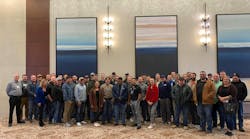In the past year, the manpower shortage we face has become item number one on many business people’s list. CONTRACTOR Magazine, and other trade publications, have been reporting on the problem for a number of years. Article after article, meeting after meeting, conference after conference have all parsed the issue into smaller and smaller pieces as to the whys and wherefores of the problem. We’ve developed the blame game to point a finger at a likely cause.
Some blame the removal of vocational education from our public-school curriculum. Some blame the push by the education establishment for every student to go to college, regardless of that person’s aptitude for higher education. Some blame the perception of the trades, and a career in the trades, as being less than desirable and somehow “less” than a college degree. Further, it seems that the idea of working with one’s hands is viewed as horribly pedestrian by the media, and the politically self-important, and they consistently produce content to that effect. The fact that looking down their collective noses at the mechanical trades has been going on for decades could be construed as a large part of the problem.
All of the foregoing statements are empirically true. In this writer’s opinion, however, they are not the real issue today. If you have followed my column over the years, you know that I am a cheerleader and staunch advocate for the trades and the excellence of a trade education.
Attracting, training and graduating capable journeymen is a cause near to my heart. As a proud third-generation master plumber and the father of a fourth-generation master plumber, you might say that I have a vested interest in seeing our trade thrive and survive moving forward.
Front and center
That said, I applaud people like Humberto Martinez of Construction Career Days; Mike Rowe, formerly of the television show “Dirty Jobs” and currently head of the “mikerowe Works” foundation; and Douglas Greene, a Ph.D. affiliated with Southeast Missouri State University, who has espoused what he calls the “Plan B” program to produce “New Collar Jobs,” whereby the university partners with junior colleges and vocational schools to steer applicants into the trades in the academic setting of college.
Add in the United Association of Plumbers and Pipe Fitters, Plumbing-Heating-Cooling Contractors – National Association, President Trump’s recent push for vocational education programs, and you finally have the issue brought front and center into the national spotlight.
So, you may ask, what is the problem? This full-court press is bound to produce the desired results, and we’ll have that new blood infused into the trades in a matter of a few years, crisis averted. After all, some of the current thinking has larger and more progressive-minded shops changing their hiring programs to hire young people with team building exercises, hefty benefit packages, and a variety of enticements, catering to the new paradigm with Silicon Valley style distractions that the younger generation seems to favor, right? Not so fast.
‘We’re churning out a generation of poorly educated people with no skills, no ambition, no guidance and no realistic expectations of what it means to go to work.’ — Mike Rowe
First, the entrenched “education industry” doesn’t see it that way. Their interests are diametrically opposed to ours.
Second, and this is the crux of this column, is the societal breakdown of the work ethic. This may not be the politically correct thing to say, and it may not make it past my editor, but the facts are the facts. In only one generation, America has managed to produce and raise citizens who not only are less educated than the generation preceding them, but who also have no concept of what working for a living means, and they know it!
We know that not all young people are so self-absorbed, but enough of them are. Enough that a conclusion can be drawn that no matter what we try to do as an industry, we will fall short of our goals simply because we cannot find enough qualified people who actually want to learn the trades.
It’s not hyperbole
Before you gather the feathers and start boiling the tar, this Mike Rowe quote speaks volumes and I don’t think it is hyperbole:
“We’re churning out a generation of poorly educated people with no skills, no ambition, no guidance and no realistic expectations of what it means to go to work.”
After corresponding with Doug Greene, he shared with me what can be considered a typical response from academia to this problem. Here’s an excerpt from an email he sent me.
“I totally agree with you on the societal issue. I sent this position paper on to one of the SEMO (Southeast Missouri) addressees for a ‘peek,’ and he came back saying that I was being too tough on what students are, or are not, learning/exposed to in high school. That was a surprise, but then he went on to say that today's students can't afford to work any harder than they already are and taking elective, non-credit courses in skilled trades would just stress them out! Where did we go wrong?”
Greene then shared a video that highlights the problem is an amusing fashion. If you would like to watch it, this is the link: https://www.youtube.com/watch?v=eR-gFiDTt8Y
So, having identified what I believe is the real problem with the lack of manpower entering the trades, you may well ask, “where do we go from here?” I have some thoughts on that. I’ll present those ideas in next month’s column. I believe the real problem we are facing has been identified. How we react and deal with it remains to be seen.
The Brooklyn, N.Y.-born author is a third-generation master plumber. He founded Sunflower Plumbing & Heating in Shirley, N.Y., in 1975 and A Professional Commercial Plumbing Inc. in Phoenix in 1980. He holds residential, commercial, industrial and solar plumbing licenses and is certified in welding, clean rooms, polypropylene gas fusion and medical gas piping. He can be reached at [email protected].









